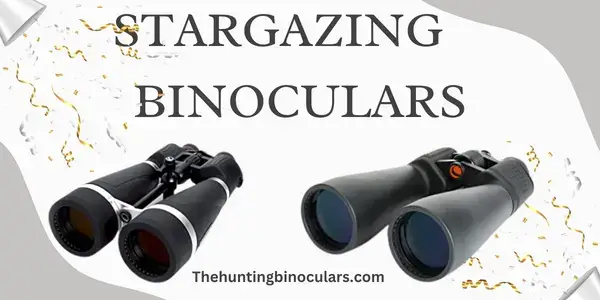
When it comes to observing sky views at night, stargazing, and astronomy, binoculars come first in mind. It is because they are small, portable, and affordable to purchase for a wonderful experience. With the help of binoculars, you can see objects 20 to 25 times greater than the normal eye.
But how to choose binoculars for stargazing? As there is a various variety of binoculars, you will have to consider multiple factors. While picking binoculars with big apertures or optical diameters, low magnification for portable views, or medium to high power for tripod attachment, would be your main concern.
Also, you will have to consider the exit pupils as well, which should be greater than 5mm. What are the other important factors to consider? Let’s begin talking about them.
Table of Contents
How to Choose Binoculars for Stargazing: Basic Tips For You
Magnification and objective lens size are two variables you should learn before choosing any set of binoculars. For example, this is the basic distinction between the finest binoculars for birding and astronomy-friendly binoculars. These specifications are given as a pair of numbers, such as 10×50, which denotes that they have a 50mm-diameter objective lens and a 10x magnification.
Thus, they are large, heavy, and need to be mounted on a tripod. There are specialized astronomical binoculars that deliver plenty of both magnification and focal length such as 20×80 or 25×100. Because of this, 10×50 portable binoculars are the finest for astronomy.
They have 10x magnification and a large 50mm field of view to let in tons of light in portable, lightweight, and compact gadgets. Also, they are simple to use. It is preferable to buy a little lightweight 8×42 binoculars for stargazing and beginners. Additionally, these dimensions are ideal for professional safaris and wildlife viewing.
Are Binoculars Good For Stargazing?
Binoculars are small gadgets that are available in different sizes and shapes. They are designed for multiple purposes such as binoculars to see the moon, stargazing, astronomy, bird watching, hunting, and space-walking. You can use binoculars to make your image or view 10 to 20x greater than the normal eye. They can help to enhance the clarity and precision of the target as compared to the naked eye.
So, if you ask if are binoculars good for stargazing, the answer is yes. They will make your vision clearer and brighter for a wonderful stargazing and astronomy experience.
What are good Binoculars for Stargazing
As there is a huge variety of binoculars, below are some best binoculars for stargazing to choose from:
- Celestron Skymaster Pro 20×80 binoculars are the best devices for stargazing
- Vixen Optics 19173 SG 6.5 x 32 WP ED Binocular
- Canon 10×42 L Image Stabilization Waterproof Binoculars
Some amazingly bigger binoculars are available in the market. And the urge to choose a big pair for stargazing is intense. When it comes to bigger and denser binoculars, it means the size of the optical viewfinder.
If they are excessively big, you won’t be willing to utilize them because they won’t be easy to carry everywhere.
So, in many situations, a smaller size is preferable. Bird watching is made easy with a set of 8×35 binoculars, which are also small enough to keep with you to observe the stars that illuminate the night sky. A benefit of less powerful binoculars is typically having a large field of view.
When viewing the night sky, using a magnifying glass that is too high can bring several issues. For instance, during meteor displays, excessive magnification can cause your eyes to get temporarily blinded if you stare straight at one of the bright lightning bolts. This will make it difficult to observe other or smaller items for some time.

What strength Binoculars do I need for Stargazing
While going to buy binoculars for stargazing, you will have to make sure whether you can see the Milky Way, stars, planets, galaxies, and other space objects with your binoculars or not. Binoculars are the best options as compared to the naked eye because the naked eye cannot see these objects clearer and brighter than the binoculars.
Thus, you must choose 10×50 binoculars for stargazing and astronomy. Also, you won’t require a tripod for this purpose.
Which magnifications are better 12×50 or 10×42 binoculars
A 1250 magnification of a binocular has a 12 times magnifying power. Do you know that this magnification power is 12 times greater than normal unaided vision? So, the “zoom ratio” would be a 20% magnification rise from 1042 to 1250.
How to Choose Binoculars for Astronomy
Which astronomy binoculars are available in the marketplace right now? When searching for the best brand to purchase from, buyers feel confused by the number of choices available. There are too many options available, including replica companies with poor construction.
Well, how to choose binoculars for astronomy? Let’s discuss it below:
1. Budget Range
Cost and effectiveness go with each other when choosing binoculars for astronomy and they are significant factors to think about. There are now more possibilities for high-performance and premium binoculars available in the market.
The most expensive pair of astronomy binoculars will not always be the greatest option for you and your hard-earned money. Other more affordable options offer excellent functionality and comfort.
2. Specification
You must ensure this item meets all of your requirements before selecting the item. Thus, considering product specifications is essential while selecting a product. They decide what the item is capable of and what it is not. With so many goods available, it’s essential to choose the one that best suits your requirements.
You should select astronomy binoculars that have been precisely designed to match your demands and are constructed of quality material. Efficiency, features, and affordability are the three key factors to consider when comparing different specs. Each of these elements will play a significant role in your selection.
3. Design Of Binoculars
It can be challenging to choose which astronomy binoculars to buy because there are so many incredible models available. Analyzing the design is one technique to make a better choice.
Materials utilized in manufacture, color scheme, and even aesthetic significance are just a few of the elements that affect a product’s overall look. So, finding an item that fully satisfies your demands and preferences can be made easier with an understanding of these factors.
4. Comfortability of Binoculars
Nobody likes to experience discomfort or restrictions while participating in their favorite activities. When deciding whether to use binoculars for astronomy, comfort is an essential factor to take into account.
There are many different kinds of astronomy binoculars available that offer safety and control as well as a seamless, pleasant performance.
What type of binoculars is best for Astronomy?
There are specifically two major kinds of binoculars that are helpful for stargazing and astronomy. Below I am going to discuss the best two types of astronomy binoculars that you can buy:
Binoculars Prism Types
There are two main types of binoculars prism
Roof Prism Binoculars
Roof prism binoculars have the shape of two straight pipes linked at the center by a focused circle. By construction, they are small and lightweight. The reason why these roof prism binoculars are so small is all about how the prisms are attached to the optical tube. Thus, these are among the best astronomy binoculars to choose from.
Porro Prism Binoculars
The more conventional design of binoculars has small eyepieces that extend out to enormous centers and onto the even broader lens aperture. Since the 1850s, this sort of binocular has been in use, and the design is essentially unchanged. The internal analysis of Porro prism binoculars is capable to throw out of line by very few hits, which is its only drawback.
Is waterproofing necessary for Stargazing Binoculars
Moisture is one essential factor, but it truly depends on how, when, and where you want to utilize your binoculars. Rain is a constant factor in this universe, which is made up of around 71% water. From this perspective, having a set of water-resistant binoculars makes perfect sense.
There are many kinds of waterproofing, and the business has developed its classification for expected standards of waterproofing to fight bogus statements.
What is the best waterproofing level of a binocular
Let’s just state that the level of waterproofing will increase with the IPX rating, without bothering you with the specifics of the waterproofing code structure. According to this, IPX6 and higher is the ideal waterproofing level.
FAQ’s
How to focus binoculars for stargazing?
Binoculars must be adjusted to your eyesight before use. Disconnect the left-hand camera lens first, then turn the key focus lever until you can see well out of your left eye. The right lens cap should now be removed, and the left lens cap should be replaced. Until you can see out of your left eye, turn the knob on the right lens.
What are the best tips for stargazing binoculars?
You can follow some tips for a pair of binoculars that can help you have a better experience. For instance, find a good vantage point, choose a clear night, download a stargazing application, set a simple and clear target, and clean your binoculars regularly.
Which one are better 10×42 or 10×50 binoculars?
If everything else is equal, viewing via 1050 binoculars could be clearer and of higher quality than those through 1042 binoculars. It is because more light equals more detail. Thus, simply collecting more light does not guarantee a view that is clearer or of higher quality.
Can I see galaxies with binoculars?
A decent pair of binoculars can enable you to gaze at the moon, planets, double stars, galaxy clusters, and nebulae, as well as galaxies and other magnificent celestial things. This is where the moon’s dawn or sunset occurs. If you want to know that can I see planets with binoculars then click on the link and read it.
Conclusion
I am sure that after going through this article, you won’t ask again how to choose binoculars for stargazing. I have tried my best to give you enough information about binoculars for stargazing. If you will consider all these major points, you can never mistake while buying a good pair of binoculars.
What are your reviews of this article?
